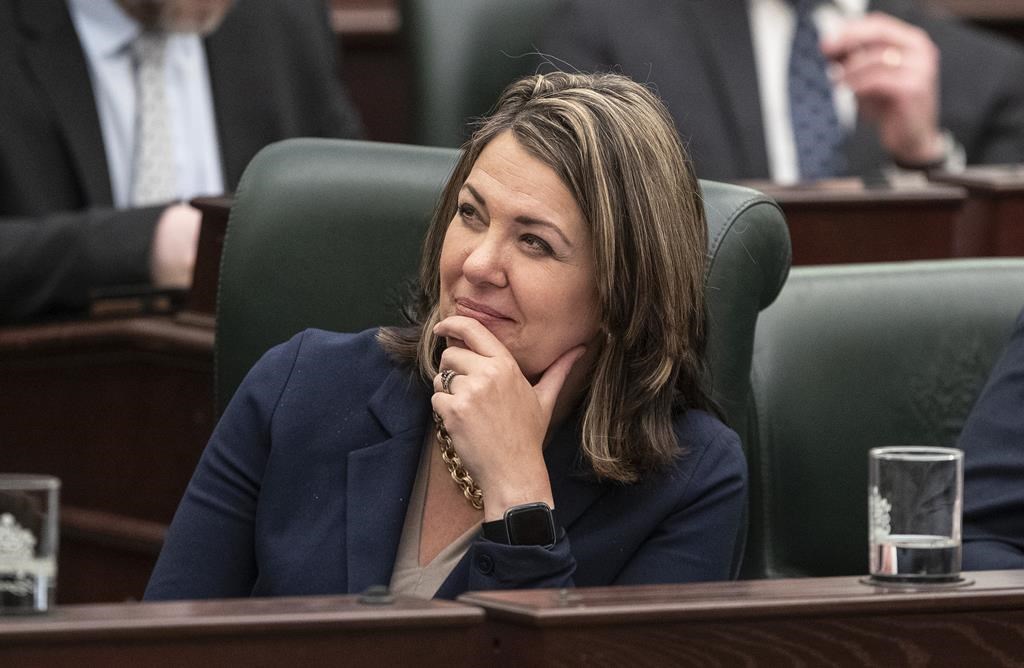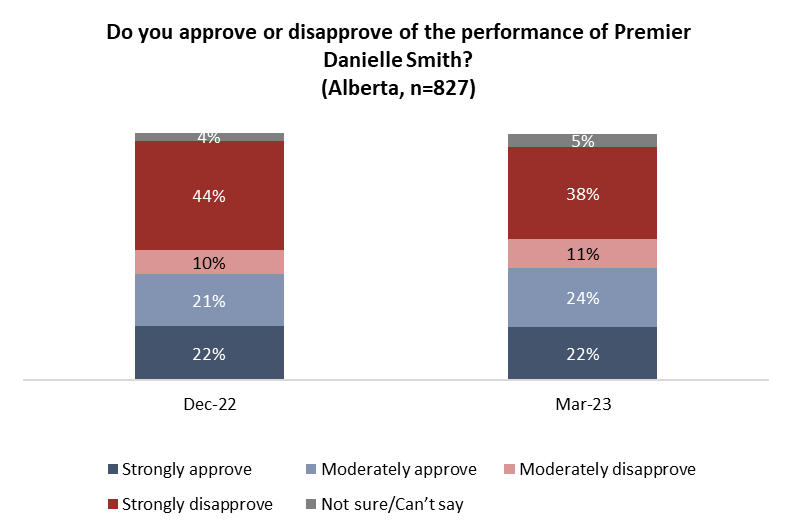More than two months before the provincial election, a poll suggests Alberta Premier Danielle Smith only has approval from less than half of Albertans.

The latest data from the Angus Reid Institute suggests that Smith only has an approval rating of 46 per cent.
Around 38 per cent of Albertans strongly disapprove of her, the report said.
Smith’s approval rating comes as rivals United Conservative Party and Alberta NDP gear up for this year’s provincial election, which is scheduled for May 29.
While Smith promised a balanced budget and a fiscal plan of $68.3 billion this year, the Angus Reid Institute said her approval rating stems from criticisms over her plan to incentivize oil companies to clean up inactive oil wells and allegations that someone from her office contacted crown prosecutors to discuss cases related to the Coutts, Alta., border blockade early last year.
Duane Bratt, a political science professor at Mount Royal University, said the data indicates this year’s election is going to be “very close.”
Smith’s low approval rating can be attributed to her “unpopularity” among many conservative voters, Bratt said. However, her approval rating is higher than former premier Jason Kenney’s during the 2019 provincial election.

“There are a lot of reluctant conservatives in Calgary who are going to have to make a choice. Do they hold their nose and vote for Danielle Smith? Do they vote for Rachel Notley? Do they stay at home?” he told QR Calgary.
“It’s going to be a challenge for her.”
Bratt also attributed Smith’s low approval rating to various statements she made after she became the United Conservative Party leader.
On the day she was sworn in as Alberta’s new premier, she made comments that the unvaccinated are “the most discriminated-against group that I’ve ever witnessed in my lifetime.” She issued a statement a day later saying she didn’t mean to trivialize minority communities and other persecuted groups in Canada.
Smith also publicly blamed Alberta Health Services for botching the COVID-19 pandemic response, claiming they did not deliver on the promised extra hospital beds to handle the flood of patients.
She also criticized the provincial health authority for directing employees to be vaccinated against COVID-19, claiming it led to needless vacancies and staff shortages.

But Bratt said her approval rating seemed to have risen a little bit now that she is speaking “a lot less freely.”
“The poll shows that her approval rating has actually risen in the last bit… I think that is because she is speaking freely a lot less,” he said.
“Can she do that during an election campaign? We’ll have to see.”
University of Calgary political scientist Lisa Young told Global News the Angus Reid poll results is good news for Smith in comparison to Manitoba Premier Heather Stefanson, who has a 25 per cent approval rating. A provincial election in Manitoba is scheduled for October 3.
“Smith is looking to be in pretty good shape as an incumbent, particularly in contrast (to Stefanson),” Young said.
“It’s interesting because when she was first elected as party leader and became premier, she didn’t get the kind of bounce that a new leader often gets in the polls. She didn’t improve much on the former premier so she’s getting her bounce later, which is unusual.
“There have been a lot of very positive government advertising that presumably helps with her image, so it’s interesting to see.”

However, Young noted that the polls also show the polarization of Alberta politics.
“While there are people who are in the middle, there are also substantial groups that are so closely affiliated with a party they identify with and are strong supporters of,” Young said.
“We’ve got two parties going into this campaign neck-and-neck in the polls. They have similar capacities to raise money.
“This is what polarized politics looks like.”
Both Bratt and Young said the UCP will take advantage of the poll results and push initiatives and policies that are advantageous to them, such as affordability payments and a balanced budget.
However, Young said it will be hard to predict what will happen once the writ drops.
“For those people who are undecided, the leaders debate in the campaign might make a difference if it’s one of those debates that has an impact,” Young said.
“External events can certainly affect the public mood… A lot can happen in 75 days, but a lot can stay the same.”
— with files from Dean Bennett, The Canadian Press.





Comments